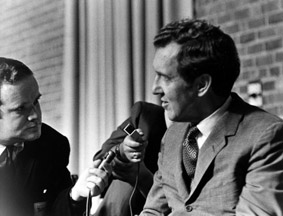Grant, new Muskie papers 'a wonderful confluence' for Bates archives
Thanks to a recent grant and a key donation of personal papers, one of the nation’s most comprehensive collections of political documents outside the presidential library system has grown even larger.
The Edmund S. Muskie Papers at Bates College constitute important holdings of material relating to the late Muskie, a member of the Bates class of 1936 who served as a Maine governor, U.S. senator, presidential candidate and U.S. secretary of state. In what the college’s head archivist calls “a confluence of two wonderful things,” Bates recently received a $65,000 federal grant to support the processing of several additions to the collection, including more than 100 linear feet of materials received from the Muskie family in 2005.
This largest and most important addition to the Muskie papers includes materials that Muskie himself saved as particularly meaningful. “This material is critical in helping to understand and complete Muskie’s historical record,” says Katherine Stefko, director of archives and special collections at the college.
The grant from the National Historical Publications and Records Commission, along with matching support from the college, will enable the Edmund S. Muskie Archives and Special Collections Library at Bates to preserve and make accessible the new materials, which filled more than 70 boxes when archives staff packed them up at the Muskie summer home in Kennebunkport.
Among the materials are scrapbooks that were maintained by Muskie until his death in 1996 and then remained with his widow, Jane Muskie, until she died in 2004.
“People close to Muskie have described this material as the cream of the crop,” says Stefko.
The donation brings the college’s Muskie holdings to some 3,000 linear feet of materials, comprising letters and memoranda; press releases and news clippings; speeches, reports and reference materials; photos, film and videotape. Much of the collection documents Muskie’s 21 years in the Senate, where his accomplishments included the landmark Clean Air Act of 1970 and Clean Water Act of 1972.
A companion collection is the Muskie Oral History Project, comprising 442 interviews with individuals who knew, affected or were affected by Muskie. That project recently got its own good news, Stefko notes, in the form of a $10,000 grant from the Muskie Foundation, money that will enable Bates oral historian Andrea L’Hommedieu to complete editing and administrative work, and develop online access to the material.
In an era of increasing interest in environmental policy and the workings of the federal government, researchers are paying more and more attention to Bates’ Muskie holdings. “It’s a collection that sees a lot of different research from a lot of different angles,” says Stefko.
During 2006, graduate and undergraduate students, politicians, legal consultants and other researchers have used the Muskie holdings to investigate such topics as the Vietnam War, labor history, legislative history and environmental law, in particular the Clean Water Act.
The grant is the college’s first from the NHPRC, which is the grantmaking arm of the National Archives. The process of preserving the new materials and incorporating them into existing holdings will run through fall 2007. The project will also involve updating the collection’s computerized index to make it more powerful and more compatible with national databases.
“We are extraordinarily lucky to have received this valuable collection and the resources to process it almost simultaneously,” says Stefko. “It’s a confluence of two wonderful things that will help us, help researchers and help the documenting of democracy, as the NHPRC says.”



